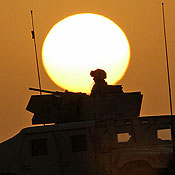 By Daniel Goldfarb. Originally published at Americans for Energy Leadership
By Daniel Goldfarb. Originally published at Americans for Energy Leadership
A good deal has been written about the military's recent efforts to "go green," but Fred Kaplan's piece for Slate last week is unique in its exploration of the potential civilian benefits of such an initiative. Kaplan does well to delineate the military's history as a robust market for innovative technologies, driving up demand and down costs:
Policy stability is currently one of the foremost concerns of the U.S. clean energy industry. With crucial stimulus initiatives set to expire and no new energy bills on the horizon, the military could be one of the few places for the clean energy industry to turn. As the Breakthrough Institute noted yesterday, military funding for the "advanced demonstration and early commercialization of promising clean energy technologies, particularly those with dual-use military applications," may be essential in the near future. It is the dual nature of DoD work - that its technology initiatives regularly benefit the national defense and civilian economy - that gives the DoD its unique freedoms. In the past, Kaplan shows, the DoD's unique attributes have allowed it to house long term and capital intensive projects when others were unwilling or unable:
"In the last half-century, many of the United States' great technological breakthroughs have been made possible because of the demand created by large-scale government projects—which, in this country, has mainly meant military and space projects... In this same way, the military's demand for renewable-energy technologies today could create the conditions for a wide commercial market in the years ahead."Also important is his recognition of the policy advantages of housing such large scale projects within the Department of Defense. Whereas Department of Energy programs face financial uncertainty, see ARPA-E, DoD programs enjoy long term funding because of the uniquely insulated nature of defense spending.
Policy stability is currently one of the foremost concerns of the U.S. clean energy industry. With crucial stimulus initiatives set to expire and no new energy bills on the horizon, the military could be one of the few places for the clean energy industry to turn. As the Breakthrough Institute noted yesterday, military funding for the "advanced demonstration and early commercialization of promising clean energy technologies, particularly those with dual-use military applications," may be essential in the near future. It is the dual nature of DoD work - that its technology initiatives regularly benefit the national defense and civilian economy - that gives the DoD its unique freedoms. In the past, Kaplan shows, the DoD's unique attributes have allowed it to house long term and capital intensive projects when others were unwilling or unable:
"Congress is more likely to fund these projects precisely because they're related to the national defense. The United States has an elaborate nationwide highway system today because, back in 1956, President Dwight Eisenhower sold the program to Congress by calling it the National Interstate and Defense Highway Act (italics added)."As Adam Sieff and I wrote last week, the military's clean energy imperative is founded on the strategic and tactical risks fossil fuels pose to American soldiers. While it may be tough to swallow DoE energy initiatives with our currently ballooning deficit, there is no excuse for not making American troops more safe. Housing energy innovation in the DoD does not just make sense in terms of unique capabilities and policy insulation, it also comes down to one of the least contentious issues, national defense. As Kaplan notes:
"Congress today has little appetite for spending billions of dollars on solar power generators or biofuel labs under the rubric of energy independence or 'going green.' But to serve the war mission, and especially to protect the troops, no sum is too lavish—and that's why the road to going green, and to achieving energy independence, might very well be paved through the fighting fields and villages of Afghanistan."













No comments:
Post a Comment